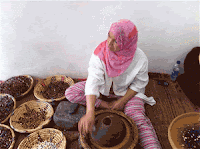 Do you use argan (Argania spinosa) oil?
Do you use argan (Argania spinosa) oil?Also called Morocco ironwood, argan oil is from the soapwood family and has a history that can be traced back more than two million years.
Argan is a culinary oil and a cosmetic oil, and has traditionally been used in both skin and hair care. Medicinally, argan oil has been used to help heal wounds and with rheumatism and arteriosclerosis.
The oil, pressed from the trees’ kernels, contains more than 80% unsaturated fatty acids, vitamin A, and large quantities of vitamin E antioxidants and sterols; it may be very nourishing when used on the skin and may be effective as a dietary supplement.
Currently, there are about 50-60 women’s cooperatives in Morocco producing argan oil the traditional way. These cooperatives are growing in number as a resource for Berber women to revive the traditional hand-pressing method of extracting argan oil and to ensure an income. Read more about the women’s cooperatives on the Targanine website.
Traditionally, argan oil is hand-pressed by the Berber women. First the trees’ fruit pulp is allowed to dry; then it is removed. The remaining nuts are cracked between two stones so the kernels can be used undamaged. The kernels are lightly roasted and then ground by hand. An oily paste forms and the oil is removed through the use of lukewarm water and constant kneading. It is then decanted.
The picture in this blog post is from ACHS President Dorene Petersen, who recently hiked through the Atlas Mountains in Morocco and watched the women hand pressing the oil. Check back with ACHS Facebook for more info from Dorene about the medicinal properties and products of argan oil, and pictures from the women's cooperatives.
Here are some links to recent research articles about potential medicinal properties and uses of argan oil that you may find interesting:
1. Effect of dietary argan oil on fatty acid composition, proliferation, and phospholipase D activity of rat thymocytes
2. Consumption of argan oil (Morocco) with its unique profile of fatty acids, tocopherols, squalene, sterols and phenolic compounds should confer valuable cancer chemopreventive effects
3. Effect of Argan Oil on Platelet Aggregation and Bleeding Time: A Beneficial Nutritional Property
Share your experience using argan oil. Do you prefer it to olive oil? Is it more moisturizing than your traditional skin care base oil?
No comments:
Post a Comment